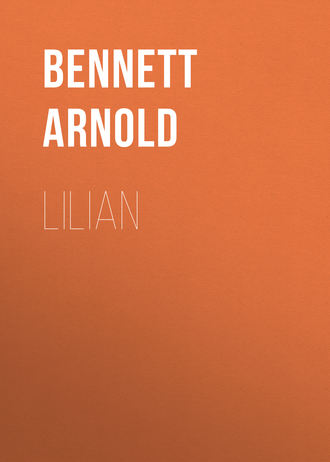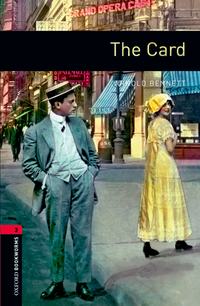 полная версия
полная версияLilian
The Widow
"Felix seriously ill; double pneumonia; we are married. – Lilian Grig." Ten words, plus Isabel's address and her own! She wrote the telegram after several trials, in her bedroom, on half a sheet of the hotel notepaper, Kate O'Connor standing by her side, the next morning but one.
"Give it me," said the white nurse. "I'll see to it for you, Mrs. Grig, as I go home."
She looked up at the nurse, and the nurse, eyes no longer laughing, looked down at her. The nurse knew everything, and, moreover, must have assisted at scores of tragedies; yet Lilian regarded her as an innocent who understood nothing essential in life. Her comforting kiss was like the kiss of a very capable child pretending to be grown up.
Voices in the other bedroom! The doctor had arrived and was talking to the second nurse. They went in together. Felix lay a changed man, horribly aged. He was a man who had suddenly learned that in order to live it was necessary to breathe, and that breathing may be an intensely difficult operation of mechanics. His lined, wrinkled face was drawn with the awful anxieties incident to breathing, and with the acute pain in both lungs. The enemy was growing in strength and Felix was losing strength, but he could not surrender. He must continue to struggle, despite the odds, and there was no referee to stop the fight, either on the ground that it had developed into an assassination or on any other ground. The brutality had to proceed. And the sun streamed through the window; and outside, from the promenade where the idlers were strolling and the band was playing, the window looked exactly the same as all the other windows of the enormous hotel.
After an examination, Dr. Samson injected morphia. The result was almost instantaneous. The victim, freed from the anxiety of the pain, could devote the whole of his energy to breathing. He sighed, and smiled as if he had entered paradise. He gave a few short, faint coughs, like the cough of a nervous veiled woman in church, and said in a hoarse, feeble, whispering voice:
"You must understand, doctor, it was all my fault. I insisted, and what could she do?" The two nurses modestly bent their gaze.
"Yes, yes," the doctor concurred.
Felix had already made the same announcement several times.
"But I want everybody to know," he persisted.
"Yes, yes," said the doctor. "I shall give you some oxygen this morning. It will be here in a minute. That will do you a lot of good. You'll see."
Lilian was the calmest person in the room. She had decided that there was no hope, and had braced herself and become matter-of-fact. She was full of health, power, and magnificent youth, and the living seed of Felix was within her. She quietly kissed Felix on his damp cheek; no gold now glistened in his half-empty mouth. She returned to her own bedroom, and Dr. Samson followed.
"He's much worse," she said firmly to the doctor.
"He is not better," said the doctor. "But there is always hope."
She glanced sadly at the soft and mournful face of the middle-aged doctor. Nurse Kate had told her the story of the doctor, who was a widower and solitary and possibly consumptive, and on account of his lungs practised on the Riviera during the winter. The vast tragedy of the world obsessed her; there was no joy nor pleasure in the whole world, and the ceaseless activities of gaiety that wearied the hotel and the Casino and the town and the neighbouring towns seemed to her monstrous, pathetic, and more tragic even than Felix's bed.
For five days she cabled daily to Miss Grig, and got nothing in reply. Felix's strength consistently waned. And neither morphia nor oxygen could help him more than momentarily. Jacqueline, the nurses, the doctor, treated Lilian as a holy madonna. They all exclaimed at her marvellous stedfastness. The manager of the hotel paid a decorous call of inquiry-though it was apparent that he was already familiar with every detail-and he, too, treated Lilian as a holy madonna. Two days later, in the evening, just after Nurse Kate had come on duty, Felix held out his hand for his wife's hand, and, casting off his frightful physical preoccupation, said in a normal voice:
"Everything's in order. Don't be an idle woman, my poor girl."
She dropped on her knees, and throwing her arms on his body, cried:
"Darling, I've killed you!" (The thought that she had brought about his death was her continual companion.) But Felix, utterly absorbed again in the ghastly effort to breathe, had no ears for the wild outburst. In the night he died. He had written a short note to his sister before the great relapse, and since then had not even mentioned her.
X
The Wreath
Dr. Samson sat late with Lilian in her bedroom the next night. It was the middle of the night. He was taller than Felix, and not so old; his face was more flat and milder, but there was something in his expression and about the wrinkles round his eyes that reminded her of Felix, and he had attached himself to her to serve her; his mournful gaze appealed to her. It was he who had made her understand that death in a hotel devoted to gaiety was an indiscretion, a lapse from good taste that must be carefully hidden. He stood faithfully between her and the world, the captive of her beauty, wanting no reward but the satisfaction of having helped her.
Not that much help was needed. The routine of such episodes was apparently fixed. Things moved of themselves. All requirements seemed to be met automatically. There was even an English cemetery in the region. Early on the morning after the death a young woman in black had called to present the card of a great Paris shop with a branch in the town, and by the evening Lilian was dressed in black. The layer-out had arrived earlier yet than the dressmaker. Dr. Samson had interviewed the manager of the hotel. An important part of the routine was that the whole of the furniture of Felix's room should be removed, and the room refurnished at the cost of the representative of the dead. Dr. Samson settled the price. Lilian decided to give the old furniture to the Alexandra Hospital. The doctor had volunteered to finance Lilian till she should be back in London; but afterwards the equivalent of nearly four hundred pounds in French and English money was discovered in Felix's dispatch-case, the inside of which Lilian had never seen. The doctor had also sent off the telegram to the mute Miss Grig: "Felix died in the night; am returning London immediately," and got the railway ticket, and accomplished the legal formalities preliminary to the burial, and warned the English chaplain, and ordered a gravestone in a suitable design and taken Lilian's wishes as to the inscription thereon. Nothing remained to be done but wait. Lilian was quietly packing; the doctor sat watchful to assist. They both heard a noise in the next room; and at the noise Lilian was at last startled from her calm. The moment, then, had come. Dr. Samson went first. The room, which ought to have been in darkness, was lighted, and not by electricity but by two candles, one on either side of the bed.
"Who has done this?" Lilian murmured, and gave a sob.
The door into the corridor was locked; to keep it locked had been part of the unalterable routine. Therefore the candles could only have been brought by somebody on the staff of the hotel. The next instant Jacqueline entered, through the bathroom. She was weeping.
"Pardon me, madam. I couldn't go to bed. I couldn't sleep. And I thought of the candles. It was too much for me. I had to bring them. If I was wrong, pardon me… They will be here soon." She threw herself down on her knees at the foot of the bed. She had spoken in French. The doctor interpreted.
"Tell her I thank her very much," said Lilian, "and ask her to go to bed. She'll have her work to do to-morrow, poor thing!"
Jacqueline rose. Lilian took her hand and turned away.
"And this came," Jacqueline added, pointing to a package in tissue-paper that lay on a chair. "The night porter has only just brought it up, and as I was coming in with the candles…"
Lilian removed the tissue-paper and saw a magnificent wreath of lilies, far finer than anything in her experience, a wreath for an imperial monarch. In the middle was a white envelope. She opened the envelope; it contained two French bank-notes for five hundred francs each. No signature! Not a word!
"She has got her money," thought Lilian. "How?" And, placing the wreath on Felix's feet, she burst into tears.
Jacqueline had vanished. Suddenly Lilian began to stride to and fro across the room. She was full of youth and force. She was full of fury and resentment. The moving muscles of her splendid, healthy body could be discerned through her black dress. She frightened the doctor.
"Ah!" she cried, with a gesture towards the wreath, "she is the only one that understands that I don't want to be comforted! Nobody else has understood. I expect she just heard that he was dead, and she doesn't know that I killed him; but she understood. She understood." The doctor, quite mystified, seized her arm to soothe her, and was astonished at her strength as she shook him off. She was like a tigress. Nevertheless, she let herself be persuaded to follow him into her own room. There her eye caught the toilet preparations which the courtesan had bestowed on her.
"And she gave me these!" Lilian laughed, hesitated, and added fiercely: "I will take them back with me! I will never use them, but I will keep them for ever and ever!" And she cast them into one of the open trunks. Then she said calmly: "Of course I know it was because of the window of the car being broken, and it would have been all right if the engine hadn't stopped. But it was my silly, silly idea to go out for a drive at night… I can't help it! I did kill him! He'd have been alive now if I hadn't behaved myself like a perfect child!"
The doctor offered no remark. She resumed all her old tranquillity, wiping her eyes carefully with a fine, tiny handkerchief that Felix had given her. The bearers arrived a quarter of an hour later-discreet, furtive and sinister. The hotel slept in its vastness. All gaiety was asleep. But even if some devoted slave of dissipation had surprised them on their way back, he could not have guessed that it was a coffin they bore. The doctor, by using his professional prestige, kept Lilian in her own room till the bearers were nearly ready to depart with more than they had brought. She went into the mortuary. The coffin was disguised. Picking up the wreath, which had been forgotten or intentionally left, she placed it upon the coffin and beneath the disguise. It lay there alone in its expensive grandeur. The bearers withdrew with their burden, tiptoeing along the dim, silent corridor lest revellers should be disturbed from well-earned, refreshing sleep and open their doors to see what was afoot in the night. The cortège was lost to view round the corner at the end of the corridor. The doctor remained a little while, and he also prepared to go. The two nurses Lilian would never see again.
"You should go to bed now and try to sleep. I'll call for you in good time to-morrow for the funeral."
Lilian shook her head.
"No, I'm going to pack his things now." She stood at the door of his room, and watched the doctor also disappear from view round the corner at the end of the corridor.
PART IV
I
The Return
It was early in July, on one of those long summer evenings of which the melancholy twilight seems determined never to end, that Lilian, from Victoria Station, drove up to her late husband's house, now her own. The events leading to the arrival, and giving it a most poignant dramatic quality, had one after another as they occurred impressed everybody concerned as being very strange and sinister; but seen in perspective they took on a rather ordinary complexion.
At the very moment of leaving the Riviera Lilian had heard that Miss Grig, on her way to the South to see Felix, had been detained in Paris by serious ptomaine poisoning due to food eaten at home. Had Miss Grig been able to get a berth in the through Calais-Mediterranée express, she might well have died in the train; but she had not been able to get a berth, and had travelled by a service which necessitated crossing Paris by taxi. She never did cross Paris. Railway officials carried her to the Hôtel Terminus, and medical aid was obtained just in time. For several days she was lost, like a mislaid and helpless parcel in the international post. As soon as she could move again she returned home, for Felix was by then dead and buried.
Lilian, on her part, did travel towards London by the through Calais-Mediterranée express, alighting at Calais extremely exhausted after twenty-eight hours on the railway. A gale was raging in the Channel. The steamer failed to enter Dover, a colossal harbour constructed in defiance of common sense for the inconvenience of seafarers, and put in at Folkestone. This detail changed the course of Lilian's journey. She was lifted ashore suffering acutely from sickness and nervous shock caused by the storm. At Dover she would assuredly not have remained more than a day or two; but Folkestone is a health-resort, and, installed in a big hotel on the Leas, she was tempted to let week drift after week in languid and expectant meditation. Felix's solicitor came down several times from London to see her and take her instructions. From him she had news of Miss Grig and of the business; but she neither saw Miss Grig nor heard from her; the silence between the two mourners was absolute; and Lilian would not be the first to break it; moreover, there was no official need for letters to pass, each party being always well informed of the situation through the medium of the lawyer. At the close of the Riviera season Lilian had a flattering surprise. Dr. Samson the faithful came to see her in Folkestone. He was staying at another hotel. He desired nothing, hoped for nothing, except to exhibit his fidelity. She had in him someone upon whom she could exercise her instinct to please, and to whom she could talk about the unique qualities of Felix. But also she had grown capricious and uncertain in temper. Perceiving at once that her little outbursts charmed and delighted him, she did not check them, but rather bestowed them upon him as favours; and the gloomy, fretful, transformed girl in unbecoming black played with some spirit the rôle of spoiled virgin from whom a suppliant adorer anticipates one day complete surrender. It was touching and at the same time comical.
As spring glowed into summer two factors gradually decided Lilian to proceed to London. Visitors increased in Folkestone; the Leas were no longer a desert, and she didn't care to be much remarked. And further, Dr. Samson advised her to have her child in London, and to settle there well in advance of the ordeal. He suggested more than one house; but Lilian would listen to no counsel on this matter. She gave out sharply that she would have Felix's child in Felix's house, which was her house-and nowhere else. The ever-silent Miss Grig was still there, but Lilian had no objection to her staying there. She knew what was due to her husband's sister. She sent for the solicitor and invited him to make all the arrangements, and to report when he had done so. In due course she journeyed to London, deliberately missing train after train on the day of departure. Dr. Samson accompanied her to the doorstep of her house and Felix's, he paid the taxi-driver, and then he shook hands and vanished. She wished to present herself alone, and to this end had postponed ringing the bell until all that Dr. Samson could do was done.
The facade of the house had been modernized, not untastefully, and was different from nearly all the other houses in Montpelier Square. The front door was of a rich, deep blue. The curtains of the windows had individuality. Lilian looked the façade up and down and from side to side. She had not even seen the house before; no, nor yet the Square. Felix! It was all Felix. "Felix" was written right across it. And it was hers-at any rate, the lease of the house was hers! It belonged to none but herself. She knew the fact, but could not imaginatively grasp it, and the effort to grasp it made her feel faint with emotion. She was frightened, she was proud, she was ashamed, she was defiant, she was almost sick.
"Why did I insist on coming here like this?" she thought. "No girl was ever in such a position before!"
The blue door opened, as it were the door of a chamber of unguessed tortures. A flush spread slowly over Lilian's face.
"Now," she thought, "now I am in the middle of it all, and can't go back."
A parlourmaid stood in the doorway-tall, stiff, prim, perfect-such a creature as would have refused to recognize for fellow-creatures the cook-generals of Putney. Her mature, hard face relaxed into the minimum of a ceremonial smile.
"Oh, good evening!" said Lilian awkwardly, no better than a typewriting girl, and stepped into the house.
"Good evening'm," said the parlourmaid, and, as she realized Lilian's condition the face relented still further and its smile flickered into genuineness. Though her eyes and mouth showed that she was virtuous to the verge of insanity, she seemed to be moved, in spite of herself, by the spectacle of languid and soft and mourning Lilian.
"Miss Grig wished me to say that she is engaged for the moment. She was expecting you earlier in the day. And shall I show you the principal bedroom? And if you have any orders… Yes'm," – following Lilian's glance at her trunks piled in the porch-"we've got a young man in as will see to them."
Lilian sat down on an old carved chair with a wooden seat. How characteristic and horrid of Miss Grig not to be ready to receive her! Not that she, Lilian, the mistress of the house, needed a reception from anyone! Certainly not! This notion braced and fortified her. A young man did appear fussily from the dark basement staircase, and pulled the trunks one after another within the house. The front door was then shut. The hall and upward staircase were already gently lighted for the evening. Beautiful silk shades over the two lamps! Not a very large house, nor very luxurious! But the carpets, furniture, and pictures had for Lilian just the peculiar distinction which she had hoped for. They recalled the illustrations of interiors in The Studio which used to come every month to Putney; and they were utterly different from the Putney furniture. Felix! All Felix! No Miss Grig! Impossible that there should be a trace of Miss Grig anywhere! This interior had been Felix's habitation. In a sense it was the history of Felix, his mind, his taste. She would have to study it, to learn it.
This interior was the first family interior she had seen since Putney. She was entering it after a period of awful lodging-houses and garish impersonal hotels. It was touchingly beautiful to her. The baby should be born in it, should grow up in it, should know it as the home of memory… Then it became a vision, a hallucination, and the owning of it became an illusion. How could she own it? Only yesterday Miss Grig had thrown her out of Clifford Street with ten days' wages for a weapon to fight the whole world with. All that had happened since was untrue and hadn't happened.
"I'll go upstairs," she said coldly to the parlour-maid. She had to be cold in order to be dignified. Milly Merrislate used to pose like that sometimes. The resemblance annoyed her, but what could she do in her weakness against the power of the situation? She did as best she might.
On the first floor the parlourmaid, switching lights off and on, said:
"This is the bathroom and so on."
"Yes. That is Miss Grig's room," in a hushed voice.
Lilian murmured no affirmative at the face of the shut door; her eyes had a gleam of cruelty, and involuntarily her hands clenched. The house began to grow enormous, endless.
"This is the principal bedroom." They went into it. Curtains drawn. Two soft lights. A narrowish bed. The dressing-table naked. A wonderful easy-chair. Polished surfaces everywhere. Cunning, mild tints-the whole mysteriously beautiful. Felix! She sank into the easy-chair, drawing off her black gloves. Another maid and the young man were bumping the trunks up the stairs.
"Will you have everything brought in here'm?"
"Please." She asked that two of the trunks should be pushed under the bed; they were Felix's. The other maid and the young man departed.
"Will you take anything'm?"
"No, thank you."
The parlourmaid softened again.
"Some tea and some nice bread-and-butter?"
Lilian gave a smile of appreciation, and thought:
"I will make this girl fond of me."
"Up here'm?"
"Yes, please."
She was alone. The room was full of secrets. She opened a wardrobe, and started back; it held Felix's suits. She gazed at herself in the mirror of the naked dressing-table; tears were slipping down her wasted white cheeks. Mechanically she pulled at a drawer. Neckties, scores of them, neatly arranged. Could one man have possessed so many neckties? She picked up a necktie at random, striped in violent colours. She did not know, and could not have known, that the colours were those of a famous school club. She was entirely ignorant of the immense, the unparalleled prestige of club colours in the organized life of the ruling classes. Mechanically again, she put the necktie to her mouth, nibbled at it, bit it passionately, voluptuously; the feel of the woven stuff thrilled her; and that club necktie was understood, comprehended, realized, as no club necktie ever before in all the annals of the sacred public-school tradition. Lilian sobbed like a child. The parlourmaid entered with the tea and the nice bread-and-butter, and saw the child munching the necktie, and was shaken in the steely citadel of her virtue.
"You'll feel better when you've drunk this'm," said the parlourmaid lumpily, pouring out some tea. "Hadn't you better sit down'm? … It won't do for you to tire yourself."
God! The highly-trained girl so far forgot herself as to spill a tear into the milk-jug!
II
Miss Grig
Lilian, having fulfilled the prophecy of the parlour-maid and felt better after drinking the tea, had just released her shoulders from her dust cloak and dropped her forlorn little hat on the carpet, when she heard a firm, light tap.
"May I come in?"
Miss Grig entered and shut the door carefully.
Lilian tried to get up from the low easy chair.
"Please! Please! Don't move. You must be exhausted."
Miss Grig advanced and shook hands. Lilian raised her eyes and lowered them. Miss Grig was shockingly, incredibly aged. In eight months she had become an old woman and a tragic woman. (The lawyer had omitted to furnish Lilian with this information.) But she was not less plump. Indeed, owing to the triumph of her instinctive negligence in attire over an artificial coquetry no longer stimulated by the presence of a worshipped man, she seemed stouter and looser than ever. She was dressed for the street.
Lilian, extremely perturbed, looked at the dilapidation and thought: "I have done this." She also thought: "This is the woman that turned me out of my situation because she fancied Felix was after me-not me after Felix. What a cruel shame it was!" And thus, though she felt guilty, she felt far more resentful than guilty. What annoyed her was that she felt so young and callow in face of the old woman, and that she was renewing the humiliating sensations of their previous interview. She felt like the former typist, and the wedding-ring on her finger had somehow no force to charm away this feeling so uncomfortable and illogical. She was not aware that her own appearance, pathetic in its unshapely mingling of the girl and the matron, was in turn impressively shocking to Miss Grig.
"I thought I ought just to say good-bye to you before leaving," said Miss Grig in a calm, polite but quavering voice.
"Are you leaving?" Lilian exclaimed foolishly. "I expected you to-"
"Felix left everything to you-"
"I had nothing at all to do with the will-I-"
"Oh no! I didn't suppose for a moment you had. Felix would never consult anybody in such matters. I'm not complaining. Felix was quite right. He made you his wife and he left you everything. It might have been different if I'd had no money of my own. But, thank God, I'm independent! And I prefer to have my own home." The tone was unexceptionable, and yet Miss Grig managed to charge with the most offensive significance the two phrases: "He made you his wife" and "Thank God I'm independent." It was as if she had said: "He raised you up from being his kept woman to be his wife-he made you honest-and he needn't have done!" and, "If I'd been at the mercy of a chit like you-!"









